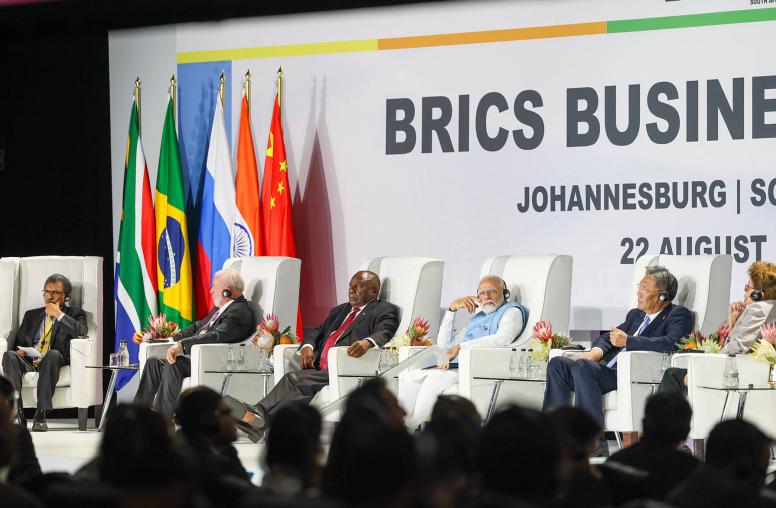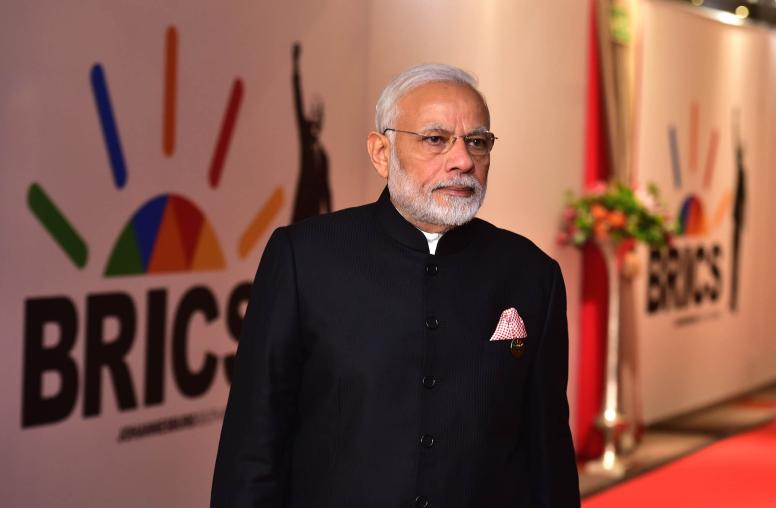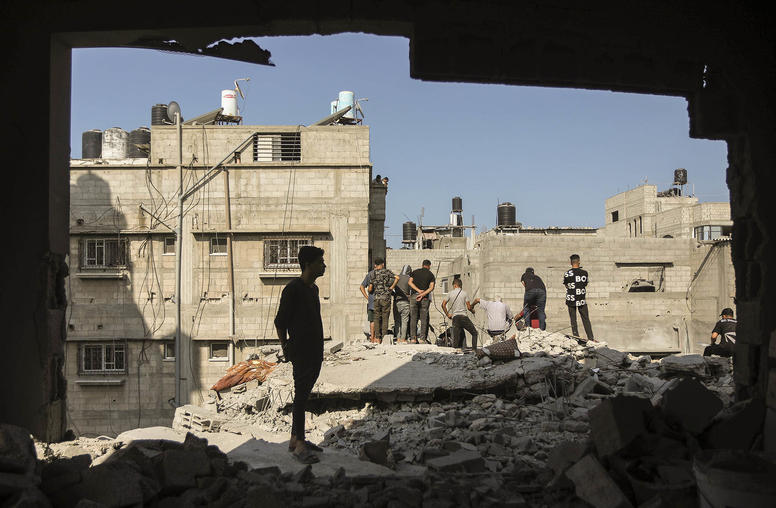To Protect the Amazon, Target Transnational Criminal Networks
Illegal deforestation has pushed the Amazon and its people to the breaking point. Stopping it requires a global effort.
Earlier this month, Brazilian President Luiz Inacio Lula da Silva, often referred to as “Lula,” resurrected the moribund Amazon Cooperation Treaty Organization (ACTO) with the group’s first summit in 14 years. Originally formed in 1995, ACTO was intended as a regional forum for its eight member-states to coordinate efforts to protect the Amazon rainforest. But prior to this month's meeting in Belém, Brazil, the organization had been mostly dormant since Lula’s first stint as Brazil’s president ended in 2010.

Since then, deforestation rates in the Brazilian Amazon — which accounts for nearly two-thirds of the entire Amazon rainforest — reached a 15-year high under the weakened environmental regulations of President Jair Bolsonaro, Lula’s predecessor. This boom hasn’t been limited to Brazil, either. Other Amazon countries such as Bolivia have seen similarly dire increases in deforestation over the same time period.
Tackling illegal deforestation and restoring the Amazon were core tenets of Lula’s campaign against Bolsonaro, and Lula’s ambitious environmental agenda has helped drop Amazonian deforestation by 34 percent since assuming office in January. By reactivating ACTO, Lula hoped to build on this early momentum to renew regional commitments to protecting the Amazon rainforest.
However, the summit itself received a lukewarm reaction. Despite establishing an alliance to combat deforestation, the summit’s Belém Declaration left each country to pursue their own individual goals — eschewing definitive joint commitments. Critics say this falls short of the vision promised by President Lula.
Of particular note: The summit did not directly address the transnational criminal organizations (TCOs) that underpin a huge swath of the commercial and illicit enterprises destroying the Amazon. Stopping these cross-border organizations is beyond the scope of any individual country — they are an international problem that requires not only further regional cooperation among ACTO nations, but a concerted effort among nations around the world.
The Dangers of Deforestation in the Amazon
The summit’s failure to obtain definitive joint commitments to halt deforestation and oil drilling poses an immediate threat both to the Amazon and the communities who rely on it, as well as a broader threat to regional stability in the long term.
Immediate efforts to combat deforestation in the Amazon are essential because the forest is approaching a tipping point referred to by scientists as “dieback,” or the point at which the Amazon can no longer regulate its own rainfall and becomes a savanna. A dry, hot Amazon would disrupt global water cycles and cause more heat and drought across the Western Hemisphere. Dieback of the Amazon would also further supercharge swings between periods of drought and extreme weather events that are already driving higher rates of displacement and water conflict.
In addition to the threats to the region posed by a collapsing Amazon, Indigenous populations who live within the rainforest are experiencing increasing rates of violence, including forced displacement and homicides, as criminal groups exploiting the Amazon seek to silence individuals who draw attention to their illicit activities.
The Threat of Transnational Criminal Organizations
Recent expansions of deforestation in the Amazon have been driven by illegal cattle ranching, China’s growing demand for soy and TCOs, who are increasingly participating in the previously noted commercial activities and other harmful endeavors in the Amazon.
According to the 2023 World Drug Report produced by the U.N. Office on Drugs and Crime (UNODC), “illicit drug economies, converging crimes, displacement and conflict are accelerating environmental devastation and degrading human rights, especially in vulnerable groups.”
Criminal groups like Brazil’s Primeiro Comando da Capital (PCC) fuel what the UNODC has estimated as a roughly 500 percent increase in illegal mining on Indigenous lands, with devastating results. In the case of the Yanomami, the world's largest Indigenous territory, somewhere between 50 to 90 percent of the population suffers from mercury poisoning as a result of mercury’s use in illegal mining on their land.
Despite this, the Belém Declaration does not name and shame these groups, nor does it establish universal commitments to halt deforestation. This is due to the low levels of trust, cooperation and government capacity among member nations that has consistently crippled ACTO in the past. Instead, the Belém Declaration proposes broadly strengthening and increasing police, judicial and intelligence cooperation in combating illicit activities, including environmental crimes.
As others have pointed out, not specifically identifying and targeting TCOs is a mistake because, as implied in the name, no one country is capable of halting the activities of TCOs — and deforestation is intimately tied up in their illicit criminal activity.
TCOs are driving deforestation in the Amazon through a variety of pathways. First, they have increased the production of coca harvests amid record-breaking cocaine demand in Europe. The Amazon’s dense, uncontrolled vastness has largely allowed drug traffickers to move freely and without consequence.
Second, as previously noted, TCOs have increased their investment in gold mining, leaving open-air, environmentally destructive pits across the Amazon landscape. This form of mining has become one of the primary drivers of the Amazon’s deforestation in Brazil, Venezuela, Guyana and Suriname, and a principal source of income for homegrown criminal groups such as Brazil’s Comando Vermelho and the PCC.
Third, TCOs have continued to illegally capture and traffic rare wildlife. Many of these animals are being shipped through networks across the world directly to China.
A preliminary report from Earth League International demonstrates just how expansive these networks are. It finds that TCOs traffic wildlife, humans and drugs between North and South America, Asia, and Europe in collaboration with cartels and mafias.
This means for ACTO to be effective, the eight signatory countries of the Belém Declaration — Bolivia, Brazil, Colombia, Ecuador, Guyana, Peru, Suriname and Venezuela — must enact a broader coalition to disrupt the global network of TCOs who exploit governance gaps in the chain of enforcement between the Amazon Basin and the destination countries where they traffic their illicit goods.
Unfortunately, conflict within and between member states, like the longstanding border conflict between Venezuela and Guyana or the recent assassination of a leading presidential candidate in Ecuador, hamstrings the ability of ACTO member states to build a broader coalition capable of combatting TCOs that are devastating the Amazon.
A Global Effort to Tamp Out Criminal Activity in the Amazon
Disrupting these vast networks means going above and beyond the sphere of Amazon countries in South America — it requires participation from the international community.
The Bali Process, a multilateral forum that works on addressing irregular migration in the Asia-Pacific, is one example of how to establish a mechanism for international cooperation to address a regional crisis with global impacts. If a similar process were to be established to address TCOs in the Amazon, it would involve targeting the illicit enterprises at various stages.
Countries whose markets drive TCO activity in the Amazon, like China and members of the EU, can address the demand side of the problem within their own borders. Meanwhile, countries like the U.K. and United States, whose financial systems are often used to launder TCO funds, can choke off pathways for TCOs to benefit from their ill-gotten gains.
The Bali Process is also notable for pulling together experts and civil society organizations in addition to governments. Such a forum for the Amazon could pull together the existing but disparate lines of effort to combat environmental crimes. It could connect mechanisms at the global level, like the Financial Action Task Force’s tracing of illicit funds from environmental crimes, to those on the local level, where various environmental police units operate throughout the Amazon.
It cannot be left to ACTO members alone to combat deforestation in the Amazon, since the forces behind the forest destruction are global. Brazil, as a member of both the BRICS and the G20 (whose focus this year is on environmental protection), must continue to lead the charge in rallying international assistance and cooperation to reverse the trend of destruction in the Amazon.
The broader international community must also answer that call at the ongoing BRICS summit and at next month’s G20 gathering. Without a coordinated international effort to assist ACTO and its member states, it’s certain that internal dissension and animosities will continue to prevent the organization from being able to establish and advance goals beyond the individual state level.
Kirk Randolph is a program officer with USIP’s Latin America program.



